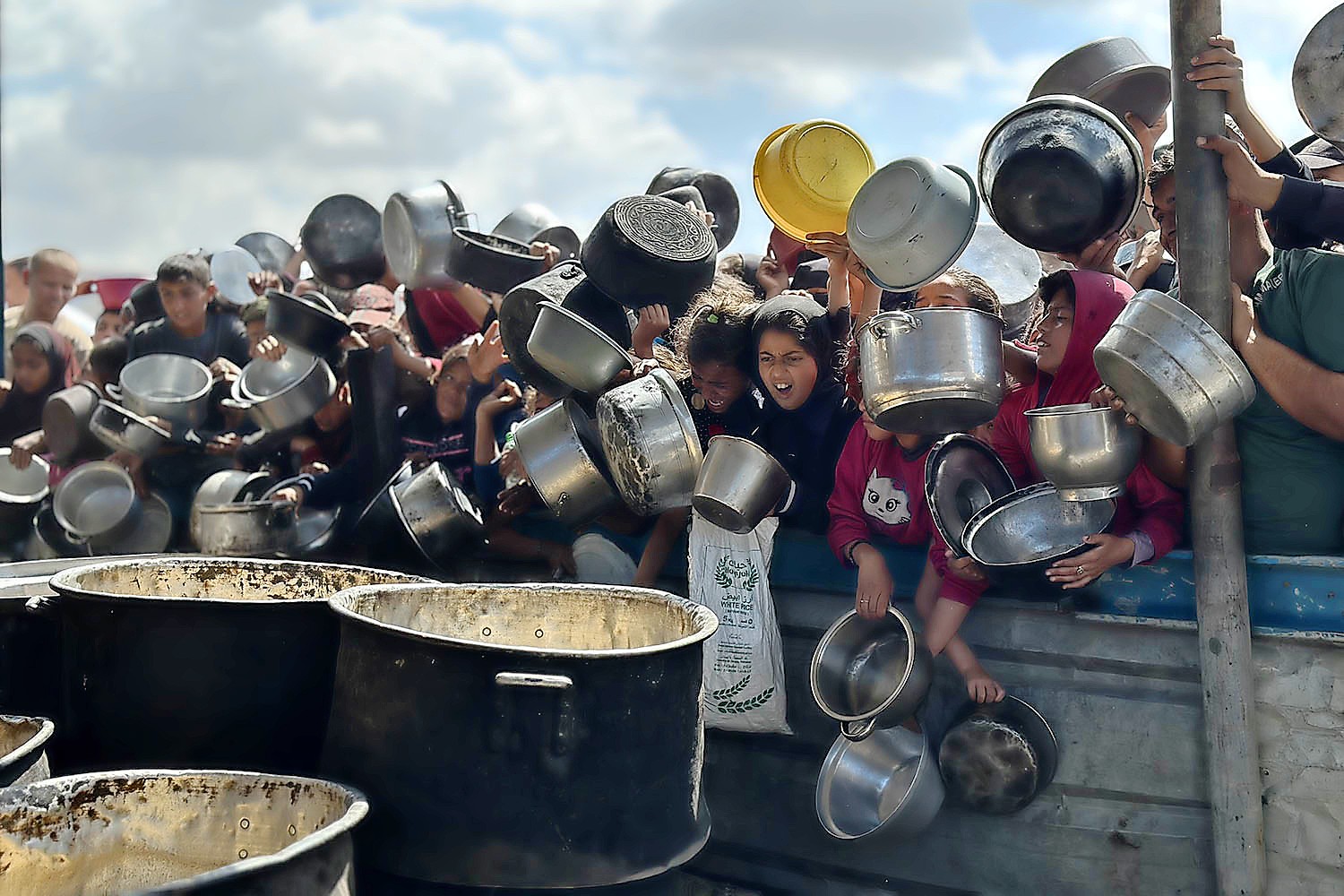At the children’s ward in the Patient’s Friends Benevolent Society (PFBS) hospital in Gaza City, hungry mothers who come to give birth are given a single meal of rice. In local markets across Gaza, supplies of canned food, as well as bags of rice and lentils have started to disappear completely.
The UN, which once ran bakeries, has closed them all after their stocks of flour and fuel ran out. The charity World Central Kitchen, which used to provide 133,000 hot meals a day, says it can no longer do so because there isn’t any food to cook with. Even the doctors and humanitarians say they are barely able to feed themselves.
A total blockade on Gaza imposed by Israeli forces in early March is pushing more than 2 million people to the brink of survival. “Nothing has entered, no food, no relief supplies, no fuel, no commercial goods. Nothing,” said Jonathan Whittall of the UN’s humanitarian affairs office last month. Supplies are dwindling while the UN says trucks filled with aid wait on Gaza '’s borders. “This is deprivation by design,” Whittall said.
His colleague Olga Cherevko described “apocalyptic” scenes among the total destruction of the urban landscape, shattered concrete and piles of rubble surrounded by pools of filthy water. Cherevko said she had seen children and the elderly desperately rummaging through piles of rubbish to find food. Last week she visited a UN hub that two months ago was filled with supplies, now “there is not one crumb left in any of the warehouses, yards or stores,” she told The Observer. Few can afford a trip to the local markets, where Cherevko has seen bags of flour priced at hundreds of dollars.
For the first time last week, Cherevko saw a fight break out as people tried to reach trucks distributing desalinated water: now she sees the same fight daily. “The level of despair and misery that prevails here is unparalleled,” she said. The sound of nearby airstrikes was audible as she spoke. Israeli authorities have said the increased blockade was intended to press the militant group Hamas to release the remaining 24 hostages held in Gaza, but it has only increased Gazans’ suffering. As the worst effects of two months with no food coming in begin to bite across a population that has struggled to survive eighteen 18 months of bombardment, destruction and siege, the Israeli prime minister, Benjamin Netanyahu, last week announced a new phase of the war in Gaza. Israeli forces will now aim to conquer and hold swaths of territory, while he said civilians will be forcibly displaced “to protect them” from the renewed assault.
“Within a few months we will be able to declare that we have won. Gaza will be totally destroyed,” Israel’s finance minister, Bezalel Smotrich, said. He added that over the next six months, Israeli troops would force Palestinians into a tiny strip of land in southern Gaza. Amnesty International warned this could amount to a war crime, or potentially even crimes against humanity if the entire civilian population is displaced.
The plan is expected to be implemented after the US president Donald Trump’s tour of the Middle East this week, as last-ditch attempts to secure a ceasefire and hostage deal between Israel and Hamas continue. But the Trump administration is already ramping up alternate plans for aid distribution in tandem with the expanded Israeli assault. Trump’s Middle East envoy, Steve Witkoff, last week reportedly briefed members of the UN security council on a plan agreed by Washington, Israel and representatives from an organisation named the Gaza Humanitarian Foundation (GHF).
The initiative would take aid distribution out of the hands of the UN and other aid groups, and place it under the control of private contractors. GHF is headquartered in Switzerland and staffed with an array of former US officials, high-profile humanitarians and corporate professionals. The former head of the World Food Programme David Beasley is listed as a prospective member of the advisory board. Its goal appears to be to divert aid away from long established international channels to a new donor-funded system, although who will fund it is unclear.
Nothing has entered, no food, no relief supplies, no fuel, no commercial goods. Nothing
Nothing has entered, no food, no relief supplies, no fuel, no commercial goods. Nothing
Jonathan Whittall, UN
In a fundraising document sent to potential donors and seen by The Observer, GHF says the current situation in Gaza is not caused by Israeli policy, saying: “traditional humanitarian channels have collapsed under the weight of ongoing combat operations, systemic aid diversion and restricted access”. Domestic Israeli politics have driven led to a “risk-averse policy towards humanitarian organisations”, the document adds.
Its proposal would initially create four distribution points, each designed to serve 300,000 people with food, water and hygiene kits. After scaling up operations, the initiative would serve more than 2 million people, with few answers as to how over a million people would find food or water in the interim.
Newsletters
Choose the newsletters you want to receive
View more
For information about how The Observer protects your data, read our Privacy Policy
The UN secretary general, António Guterres, and the UN’s emergency relief coordinator, Tom Fletcher, have both rebuffed the plan, fearing it will both limit aid and endanger the civilians who try to reach it by forcing hundreds of thousands to crowd around just four distribution points. “We will not participate in any arrangement that does not fully respect the humanitarian principles: humanity, impartiality, independence and neutrality,” Guterres said.
Whittall warned last month that “almost 70 percent of the strip is now either in a displacement zone, or a no-go zone where people can't reach.” Concentrating millions into ever-shrinking areas, in other words, has sparked new fears that crowds could be displaced to another area that comes under bombardment as has happened in the past.Then there are the fears of what an intensified Israeli military operation could bring. The defence minister, Israel Katz, said last week that the ground campaign, named Operation Gideon's Chariots, would see troops “act with great force” and remain in “every area that is taken”, while pushing millions of people to the south of the strip.
Netanyahu and Katz’s predecessor, Yoav Gallant, are already wanted by the international criminal court over accusations they sought to create famine in Gaza, and forced displacement is considered a war crime. Israel’s neighbours, particularly Egypt, have expressed fears that efforts to push Gazans south is ultimately intended to force them out of the territory altogether.
At the PFBS hospital, Dr Saeed Salah, who oversees the children’s ward, said he hopes desperately that Israel’s planned offensive does not happen. “If they go through with this plan, those that don’t die from bombing will die from malnutrition, a lack of clean water or no access to healthcare,” he said.
Photograph by Doaa Albaz/Anadolu

